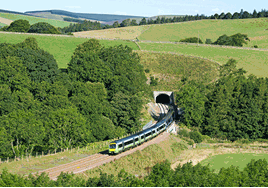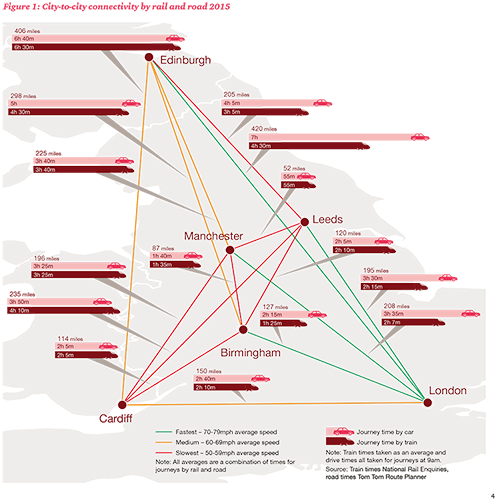No part of England has an equivalent democratic body, so a challenge for TfN will be welding six separate metropolitan authorities accustomed to doing things their own way into a unified vision for the Northern Powerhouse. Similarly West Midlands Rail is a partnership of 14 metropolitan district, shire and unitary local transport authorities - but there is a world of difference between the needs and priorities of Dudley and Herefordshire.
However, as Jonathan Bray, of the Urban Transport Group, points out: “Rail North shows people can reconcile their aspirations into a collective view, which is quite an achievement given the number of local authorities. It is better they do this than having it done by Whitehall. PTEs have managed to reconcile differences in the past by trade-offs and placing core needs at the top of a list. It would be foolish to pretend everything will always be harmonious, but it is still a case of better together.”
Paradoxically, surrendering certain local powers can be part of the new order. Strathclyde Partnership for Transport (SPT) no longer has the rail powers it once exercised as Strathclyde Passenger Transport Executive, but still runs the Glasgow Subway. SPT is one of seven regional transport partnerships (RTPs) set up by the Transport (Scotland) Act 2005 that provide Transport Scotland with local input as part of their remit to use transport to stimulate sustainable economic development.
Faster and cheaper decision-making should be another benefit. Professor Stuart Cole, of the University of South Wales, cites the long tussle over the extent of electrification in South Wales, which included a Ribblehead Viaduct-style argument over the difficulty and cost of wiring the Severn Tunnel.
And Campaign for Better Transport Chief Executive Stephen Joseph adds: “The whole argument for the Northern Powerhouse and devolution is that investment has to be seen as a regeneration project, and local bodies will take a more holistic view of the benefits and costs.”
The principle is to devolve where possible to the most appropriate level of governance for the nature of the decision to be taken, and that in doing so this will help to address some of the decades-long criticisms of transport and planning. As the CBT summarises it: “Devolved transport authorities are also better able to ensure that decisions on local transport relate to the ways in which local economies are developing. They can better align transport with land-use planning, reducing congestion, pollution and car dependence and adding value to developments.”
The innovative specification of the new ScotRail franchise, thanks to the input of Transport Scotland, was covered in RailReview Q4-2014, and a similar process has been carried out by the North.
Transport for the North Chief Executive David Brown says that they “asked what was required to grow the economy of the North. We listened to local transport authorities across the North and produced a business-like strategy with evidence for enhanced and new services so that it wasn’t just a wish list. This research was presented to bidders, and the service enhancements in the new franchises will see the biggest transformation of railways in the North for a very long time, leading to huge further growth.”
TfN and Rail North have drawn on the experiences of Merseyrail and Transport Scotland in their work on the ARN and TPE franchises. David Hoggarth, Director of Rail North, is looking to develop RN’s expertise so that the Rail North Partnership (with new local management team) will have the ability to take over full franchising and management responsibilities when the northern franchises come up for renewal in seven to ten years, as envisaged in the agreements.
“The new partnership model of 50/50 management with the DfT is a good stepping stone to full devolution, giving regional ownership from day one,” he says. “Under the partnership agreement a 50/50 board will oversee the work of the management team based in Leeds. Rail North has the flexibility to make improvements and enhancements provided we don’t cost the Secretary of State more money or we fund any changes.”
For Brown, that means quite small schemes that would never become part of a national plan can be implemented:
“For me, devolution is about putting the responsibility in the right place so objectives are being met. Scotland is a good example. They are much clearer about their strategic priorities, so they can make the case and allocate the funding.”
In London, TfL and DfT are establishing a better way of working together - a more logical way of organising their spheres of influence. That will entail the transfer of contracting responsibilities for further inner-suburban rail services from DfT to TfL as they come to the end of their franchise period. As with current London Overground and Crossrail lines, TfL will look after both procurement and management, using the concession model that has proved so successful.
Geoff Hobbs, head of transport planning for London Rail and Underground, doesn’t advocate concessions in all circumstances: “The concession model is good for urban railways because we ask for a restricted number of objectives, for which we incentivise them very heavily. All are overwhelmingly within their control - such as minutes of delay and all aspects of service quality - but not fares, demand and revenue.
“A concession is appropriate in an urban context where there is not much practical alternative to taking a train to work. We do not want a concessionaire to operate in competition to buses. We have used this model for buses, trams and heavy rail, and found a strong correlation between the way the contracts are written and the quality of service.”













